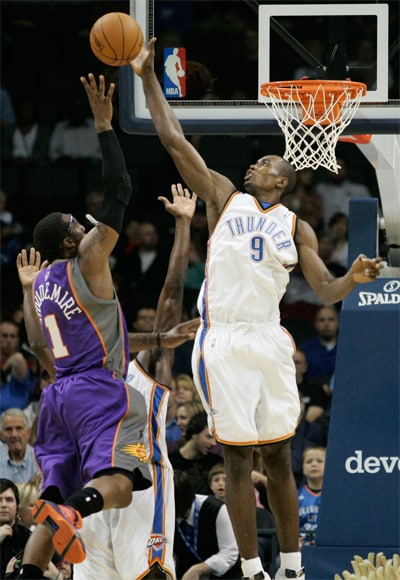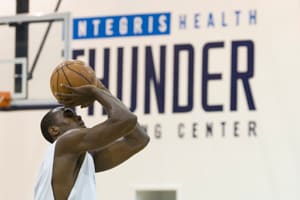
HE’S FOND OF BRICKTOWN, bowling and the Olive Garden Restaurant.
He just learned how to drive, recently settled into a place he will call home, started English classes and obtained his Social Security Number.
And lest we forget, he’s here to play basketball for a living.
For Serge Ibaka, it’s another year on another continent, although this time he’s hoping Oklahoma City will be his final stop for the foreseeable future. He left a good impression on Sunday against the Lakers, when Ibaka recorded 11 points, 13 rebounds and five blocks in his first extended minutes of the season.

Blessed with raw athletic talent, brute strength, extreme versatility and a quick wit, Ibaka has found himself yet again in transition. And that’s a good thing.
Consider this: in the past four years, he has lived through a civil war, been separated from his family, moved to Spain, learned a new language and culture, been drafted into the NBA and moved to Oklahoma City.
All by the age of 19.
SERGE IBAKA WAS BORN on Sept. 18, 1989, to basketball-playing parents in the city of Brazzaville, the capital of the Republic of Congo and home to nearly 1.5 million Africans situated along the Congo River.
It was not an easy place to grow up.
The third youngest of 18 children, Ibaka was forced to leave his hometown around the age of 8 at the start of the Second Congo War, also known as Africa’s World War. A bloody civil war that was chronicled throughout the world, more than five million people died as a result of that conflict and aftermath.
Raised by relatives during the civil war, Ibaka returned home three years later. It was then that he started to pursue his love of basketball. Ibaka's father, a member of the country's national team, introduced his son to the game.
Organized basketball in Congo was scarce. Ibaka learned the game mostly on the streets, where courts were speckled with holes and divots and the children played in plastic sneakers; Nike, adidas or Reebok weren’t options.
But Ibaka’s raw talents could not be suppressed.
By age 16, he was playing for the club Avenir du Rail, a team that competed in an African pro circuit.
From there, Ibaka continued to climb the circuit ranks, and it wasn’t long before he landed on the radar of European scouts. In September of 2006, Pere Gallego, from the Barcelona-based sports agency U1st Sports, had a contact watching the African Junior Championships in Durban, South Africa. Ibaka was named MVP of the tournament.
Soon after, U1st Sports contacted Ibaka’s family and coordinated arrangements for him to play in Spain.

WHEN HE LANDED IN SPAIN in March of 2007, Ibaka essentially started from scratch.
U1st Sport was there to help him adapt, but Ibaka had to do much of it by himself.
“That was something that surprised me a bit, because he didn’t have a normal education with all this civil war mess and the problems of one of the poorest countries in the world,” Gallego said via email. “But despite having this background, he was very polite, very formal and able to learn quickly as speaking a new language (Spanish) in few months.”
Ibaka played for the Spanish clubs L’Hospitalet in Barcelona of the LEB, a second-tier league, and DKV Joventut before landing with Ricoh Manresa.
In late 2007, the Thunder organization began to scout Ibaka after watching him compete at an adidas Nations Camp in New Orleans, where he solidified himself on the NBA scouting scene.
“It was a mixture of things – his size, his athleticism, his competitiveness,” Thunder Director of College and International Player Personnel Rob Hennigan said. “He has an intriguing upside because not only does he have the physical tools but he has a natural touch offensively, and he’s got a great mental approach to the game. He really takes it seriously. He’s really driven.”
That much was evident when Manresa Head Coach Jaume Ponsarnau first met Ibaka, who joined the club after the Oklahoma City franchise selected him with the 24th pick of the 2008 NBA Draft.
“I remember a young man, nervous, and I had the sensation that he didn’t understand me at all because he did not know Spanish,” Ponsarnau said in a Spanish interview at the Las Vegas Summer League. “I remember his eyes, they were of an intelligent person. He was trustworthy, and I really wanted to work with him. He had the intelligence and the virtue to understand things.”
Having played only two years of structured basketball, Ibaka was still developing some basic skills. With Manresa, however, his game developed enough to the point where the Thunder would bring him to the United States after two seasons in Spain.
While with Manresa, Ponsarnau said that Ibaka immediately immersed himself in the Spanish culture. Ibaka learned the language on his own, primarily from reading team publications and through everyday life. Three months in, he was already fluent in Spanish. His charisma made it easy for him to make friends.
“One thing that, regardless of who you speak with, everyone will tell you that Serge is incredibly bright and has an uncanny ability to pick things up very quickly,” Hennigan said.
And that also was true on the basketball court.

Manresa competes in the ACB, the premier professional basketball league in Spain and considered by many to house the best competition outside the NBA.
It’s in the ACB that NBA players such as Pau Gasol, Andres Nocioni, Luis Scola and Anderson Varejao got their start.
So Ibaka’s learning curve was accelerated a bit.
And while they were a continent away, the Thunder was proactive in its engagement with Ibaka. During last season, the Thunder organization constantly sent members of its basketball operations staff to Spain to spend time with Ibaka. Thunder Director of Athletic Performance/Assistant Coach Dwight Daub and Assistant Coach Brian Keefe traveled to Spain before the start of NBA training camp to coordinate a plan for Ibaka with Manresa.
“We really made a huge effort to work with the team,” Thunder General Manager Sam Presti said. “They did an unbelievable job, Manresa.”
The Thunder organization wanted to find the best way to make Ibaka the most successful player he could be, and that was by keeping his game simple and streamlined.
“It really was just stressing work habits, competitiveness and being very good at a small number of things rather than being decent at a large number of things, if that makes sense,” Hennigan said.
Added Ponsarnau, “He was a little confused at the beginning so we tried to guide him as a player with very defined parameters. He was a player that needed to take advantage of his versatility. We taught him that he didn’t need to be a forward. We were going to work to find what kind of player he was going to be. We told him that it was important to improve his shots and that it was important to improve his dribbling.”
Manresa also stressed fundamentals such as floor spacing and penetrating the lane without the basketball.
Throughout the course of the regular season, Hennigan, Presti, Assistant General Managers Rich Cho and Troy Weaver and Director of Pro Player Personnel Bill Branch each made trips to see Ibaka and check on his progress.
At first, Ibaka played sporadic minutes, and it wasn’t until the New Year that he started to get regular playing time. In 31 games with Manresa, he averaged 7.1 points, 4.5 rebounds, 1.0 blocks and shot 55.7 percent from the field in 15.5 minutes per game.
Throughout the course of the season, the Thunder saw Ibaka’s confidence continue to grow. By the conclusion of the ACB season in early May, the organization decided it would strongly consider bringing him to the United States for good.
BY THE END OF IBAKA’S first week in Oklahoma City in June, nearly everyone on the basketball operations staff spent time with him in various settings, whether it was dining out, attending meetings or just playing basketball. The idea was to create an intimate, personal environment where everyone could get to know Ibaka, and he could get to know them.
Because his English is still choppy, Ibaka felt most comfortable speaking in his native language of Lingala and French, as well as Spanish. Until he can master another language – Ibaka is taking English lessons regularly at the team’s practice facility – he’s been lucky to have the help of forward Moses Ehambe.
Ehambe was born in Texas, played at Oral Roberts and spent the past season playing for the Tulsa 66ers. He also happens to be of Congolese descent, and by some crazy chance his sister attends a nondenominational church in Africa where Ibaka’s father is a minister.
Because of their similar roots, Ehambe has spent a majority of the summer, including both the Orlando and Las Vegas summer leagues, alongside Ibaka, helping translate interviews as well as serve as an intermediary between Ibaka and the Thunder coaching staff.

They met at the Thunder practice facility, unaware that they were both from Congo.
“Ever since then, we’ve just been buds,” Ehambe said. “He calls me ` yäb’yäb,’ ’ which means big brother. He’s like a little brother.”
Throughout the summer, the two often frequented Bricktown, where they’d go out to dinner or just stroll around town. They’ve also been to the movies and Ehambe was there for Ibaka’s first bowling experience.
There’s certain things from his native land that Ibaka still craves, such as the cuisine. Lucky for him, his English teacher is from the Congo and has invited Ibaka over for Congolese fare from time to time. Aside from that, Ehambe said that the Olive Garden tops the list of places to dine out.
“I like it a lot,” Ibaka said of Oklahoma City. “It’s really relaxing, peaceful. It’s way different than in Spain, but I like it a lot, especially in Bricktown. It’s fun.”
Ibaka’s coming-out-party of sorts came during both summer leagues. After posting averages of 12.3 points and 3.3 rebounds on 67.9 percent shooting in four games in Orlando, Ibaka averaged 5.4 points and 5.3 rebounds in about five fewer minutes per game in Las Vegas.

His spike in rebounding was encouraging after the coaching staff challenged him to become more aggressive in the paint.
“So that shows you that he’s picking up on stuff,” Ehambe said. “It’s amazing how bright he is.”
Ibaka’s English had greatly improved each month heading into training camp, and by mid-September he had already passed the written portion of his driver’s test.
But Ibaka is still adapting to the NBA game. It’s a main reason why the forward has remained in the United States since Las Vegas. It’s also helped that he attended most if not all voluntary workouts back in Oklahoma City, where he’s had the chance to meet and bond with his new teammates. As the season progresses, Ibaka will continue to learn the game’s nuances.
“I know I’ll get it,” he said, confidently.
Added Presti, “It’s that humility that we really like about him. And he wants the challenge of continuing to try to get better and he’s excited about that. It’s a big undertaking for someone that age to come over at 19 years old and tackle these things. So it’s going to take some time. It’s going to take support from the organization, the fans and everyone involved to continue to understand what he’s trying to do, and ultimately let him be who he is.”
Story first seen in Thunder Magazine.
Other Links: